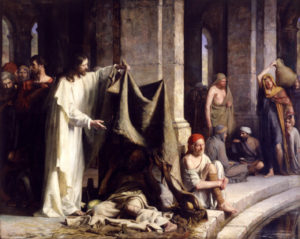
What Wondrous Love is This?
“What Wondrous Love is This
That Caused the Lord of Bliss
To Bear the Dreadful Curse,
For My Soul?”
Conspiracy theories do not usually grip me, but I am becoming more and more convinced that this Coronavirus was the brainchild of videoconferencing companies like “Zoom,” and “Facebook Live.” Of course, I am joking, but the degree to which all of society, and especially the church, have somewhat uncritically turned to online platforms for meetings of all kinds is shocking. As a product of the need to limit social interactions and the spread of a virus, this change has a logic supporting it, but is still painful, especially for Christians. The distance between us for corporate worship is compounded by the fact that clergy and loved-ones are currently not permitted in spaces once considered sacred, like the bedside of a dying patient or in the room of an already isolated shut-in. This really hurts for the church. Yet, many within the church do not see this as something to be lamented but embraced. Is a shift to online platforms and “distant” forms of worship and engagement not simply the way forward in an increasingly technological age? Where should the church look to gain her bearings to answer this question? Unsurprisingly, I suggest she look to Christ. By gaining our footing on the sure foundation of Christ, particularly during this Holy Week, we recognize that the tactile, bodily, sometimes dirty and even potentially dangerous life of Christian communities in the church is not optional, but the only way for Christ’s Church.
Christ Healing the Sick – Carl Bloch, 1883. Public Domain
The life, death, and resurrection of Jesus Christ lie at the very heart of our Holy Week celebrations and our life as Christian communities. Christ’s life was marked by the dangerous task of drawing in the least and the lost, the sick and the dying, the clean and the unclean. While 1st Century Palestinians may not have had the deep understanding of viruses that we enjoy as modern people, they had even stronger senses of and categories for what was clean and unclean. As I see images on the news of loved ones lucky enough to still see relatives in care facilities through glass enclosures to prevent the spread of disease, I am reminded first that not as much has changed as we would like to imagine. Many stories of Jesus’ healing through touch and a nearness to the sick come to mind as well. When Jesus heals a leper by touching him in the fifth chapter of St. Luke’s Gospel, did Jesus know that what he was doing was dangerous? Did he know that leprosy was contagious, and what great risk he was putting himself in when he touched a man “full of leprosy,” and bid him “be clean”?
Christ’s pushing of these boundaries did indeed kill him, though not because he contracted an illness. There is a sickness even stronger than coronavirus, leprosy, or any other infectious disease we can imagine, the sin-sickness of humanity without God. It is this sickness which drove the perfect God-man before Pilate to be flogged for crimes he never committed, to be nailed to a Roman cross, to be tormented and tortured by the very people he is saving, and finally to give his final agonizing breath. Who Jesus Christ is and the things he did in his earthly life killed him.
The ministry of Jesus Christ looks like a coronavirus curve turned upside down. It begins in the highest places and descends to the lowest places, to the depths of despair, before being taken up again to the right hand of God the Father. This is a dirty, dangerous, germ-infested, unclean way to go about life and ministry, but it is none other than the way of salvation.
This way of salvation is the way for the Church. God was perfectly free to treat our sin and rebellion as human beings in any imaginable way, but the way he chose was to come down and live among us, in our filth, dirt, sickness, and uncleanness. The totality of the life of Christ on earth is summarized in his descent from the cleanest of places to the uncleanest place. Zoom meetings, recorded services to be read at home, and a deprivation from the spiritual food of the Eucharist is temporary. The church has endured seasons such as this before, most recently in the flu epidemics of the early 20th century, and she will endure this as well.
It is this inevitable time following our current season that draws my focus now. When we look to that time, we must do so with a focus on the incarnational, cross-centered way of ministry given to the Church in the life, death, and resurrection of Jesus Christ. It is imperative that as the Church turns toward what is sure to be a new normal, she does so on this foundation laid by Christ. The church may temporarily alter the shape of its ministry in times like this, but such a change is truly a deprivation. Mysteriously, God works in this time, but we are right to long for a return to a robust ministry of Word and Sacrament together again. This Holy Week, we direct our prayer to this end, remembering that God is the one who freely chose to enter into our sickness, to raise us up again to the wholeness and wellness He alone gives.
Yours in Christ,
Fr. Matt

